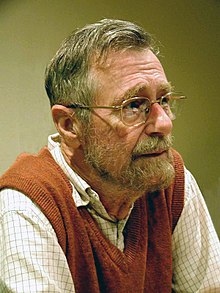Edsger Dijkstra
Edsger Wybe Dijkstra (Dutch: [ˈɛtsxər ˈʋibə ˈdɛikstra]; 11 May 1930 – 6 August 2002) was a Dutch computer scientist and an early pioneer in many research areas of computing science. A theoretical physicist by training, he worked as a programmer at the Mathematisch Centrum (Amsterdam) from 1952 to 1962. He was a professor of mathematics at the Eindhoven University of Technology (1962–1984) and a research fellow at the Burroughs Corporation (1973–1984). He held the Schlumberger Centennial Chair in Computer Sciences at the University of Texas at Austin from 1984 until 1999, and retired as Professor Emeritus in 1999.
One of the most influential members of computing science's founding generation, Dijkstra helped shape the new discipline from both an engineering and a theoretical perspective. Many of his papers are the source of new research areas. Several concepts and problems that are now standard in computer science were first identified by Dijkstra or bear names coined by him.
Computer programming in the 1950s to 1960s was not recognized as an academic discipline; Dijkstra, who had a background in mathematics and physics, was one of the moving forces behind the acceptance of computer programming as a scientific discipline. Dijkstra coined the phrase "structured programming" and during the 1970s this became the new programming orthodoxy. Dijkstra's ideas about structured programming helped lay the foundations for the birth and development of the professional discipline of software engineering, enabling programmers to organize and manage increasingly complex software projects.
...
Wikipedia

